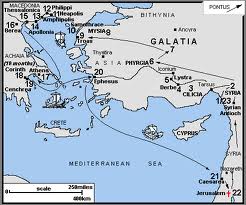 Some may ask, “Why should we study the missionary methods of Paul? Surely, in all this time, we have grown beyond his old ways and have found better ways of accomplishing ministry.”
Some may ask, “Why should we study the missionary methods of Paul? Surely, in all this time, we have grown beyond his old ways and have found better ways of accomplishing ministry.”To this I would say, look around at the condition of the church at large throughout the world today, and see if you can find a model of success that compares to Paul. Yes, we have our “mega-churches.” They have huge congregations and lots of money, but are they successful in the sight of God? Are they raising up a generation of mature, Bible-instructed believers? I think not. The ignorance of the average believer today is astounding. Many cannot even give a clear presentation of the Gospel message.
In a recent survey across the United States, only about 13% of regular church goers said that they believe in hell, and about the same number doubted the inspiration and infallibility of the Bible. The church as a whole is in a shambles, and the reason is that we have forsaken the God-given way—exemplified by Paul—to achieve the great commission of “making disciples of all nations” (Mat 28:19).
Gene Cunningham - June 9, 2000
Life of Moses #9
Scripture References: Numbers 12:3, Genesis 43:33, Hebrews 11:28, Psalms 18:34, Colossians 1:15, Ephesians 1:8, Romans 12:3, Exodus 11:4-10, Exodus 12:29-39, Revelation 16:2-14, Psalms 37:11, John 6:54, Exodus 10:28, Matthew 5:5, Exodus 12:1-25, Exodus 10:27, Exodus 11:1-3, Genesis 49:3, Exodus 10:20-29
From Series: "Life of Moses"
After 40 years in the Egyptian palace then 40 years in the desert then 40 years leading Israel to their land Moses' life can actually teach us about living in the time we live.

